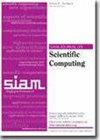Adaptive Space-Time Domain Decomposition for Multiphase Flow in Porous Media with Bound Constraints
IF 2.6
2区 数学
Q1 MATHEMATICS, APPLIED
引用次数: 0
Abstract
SIAM Journal on Scientific Computing, Volume 46, Issue 3, Page B306-B330, June 2024.Abstract. This paper proposes an adaptive space-time algorithm based on domain decomposition for the large-scale simulation of a recently developed thermodynamically consistent reservoir problem. In the approach, the bound constraints are represented by means of a minimum-type complementarity function to enforce the positivity of the reservoir model, and a space-time mixed finite element method is applied for the parallel-in-time monolithic discretization. In particular, we propose a time-adaptive strategy using the improved backward differencing formula of second order, to take full advantage of the high degree of space-time parallelism. Moreover, the complicated dynamics with higher nonlinearity of space-time discretization require some innovative nonlinear and linear solution strategies. Therefore, we present a class of modified semismooth Newton algorithms to enhance the convergence rate of nonlinear iterations. Multilevel space-time restricted additive Schwarz algorithms, whose subdomains cover both space and time variables, are also studied for domain decomposition-based preconditioning. Numerical experiments demonstrate the robustness and parallel scalability of the proposed adaptive space-time algorithm on a supercomputer with tens of thousands of processor cores.
多孔介质中具有约束条件的多相流的自适应时空域分解
SIAM 科学计算期刊》,第 46 卷第 3 期,第 B306-B330 页,2024 年 6 月。 摘要本文提出了一种基于域分解的自适应时空算法,用于大规模模拟最近开发的热力学一致储层问题。在该方法中,约束条件通过最小型互补函数来表示,以强制执行储层模型的实在性,并采用时空混合有限元法进行并行时整体离散化。特别是,我们提出了一种使用改进的二阶后向差分公式的时间自适应策略,以充分利用高度的时空并行性。此外,时空离散化的复杂动力学具有更高的非线性,需要一些创新的非线性和线性求解策略。因此,我们提出了一类改进的半滑牛顿算法,以提高非线性迭代的收敛速度。我们还研究了子域同时涵盖空间和时间变量的多级时空受限加法施瓦茨算法,用于基于域分解的预处理。数值实验证明了所提出的自适应时空算法在拥有数万个处理器内核的超级计算机上的鲁棒性和并行可扩展性。
本文章由计算机程序翻译,如有差异,请以英文原文为准。
求助全文
约1分钟内获得全文
求助全文
来源期刊
CiteScore
5.50
自引率
3.20%
发文量
209
审稿时长
1 months
期刊介绍:
The purpose of SIAM Journal on Scientific Computing (SISC) is to advance computational methods for solving scientific and engineering problems.
SISC papers are classified into three categories:
1. Methods and Algorithms for Scientific Computing: Papers in this category may include theoretical analysis, provided that the relevance to applications in science and engineering is demonstrated. They should contain meaningful computational results and theoretical results or strong heuristics supporting the performance of new algorithms.
2. Computational Methods in Science and Engineering: Papers in this section will typically describe novel methodologies for solving a specific problem in computational science or engineering. They should contain enough information about the application to orient other computational scientists but should omit details of interest mainly to the applications specialist.
3. Software and High-Performance Computing: Papers in this category should concern the novel design and development of computational methods and high-quality software, parallel algorithms, high-performance computing issues, new architectures, data analysis, or visualization. The primary focus should be on computational methods that have potentially large impact for an important class of scientific or engineering problems.

 求助内容:
求助内容: 应助结果提醒方式:
应助结果提醒方式:


